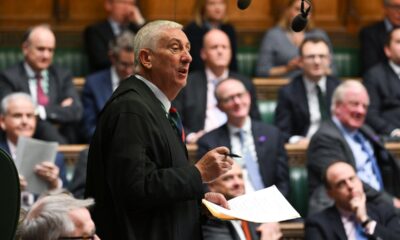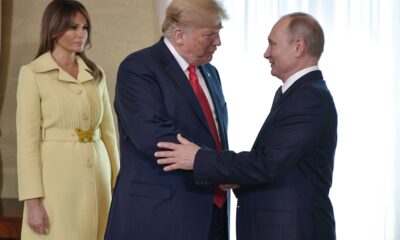Business
Trump Imposes 25% Tariff on India Over Russian Oil Imports

President Donald Trump has announced a significant increase in tariffs on Indian imports, imposing an additional 25 percent levy in response to India’s continued purchases of oil from Russia. This executive order, signed on Wednesday, elevates the total tariff on Indian goods to 50 percent. The move comes as Trump accused India of “fueling the war machine” by importing Russian oil.
On Tuesday, Trump indicated his intention to escalate the tariff situation further, warning that the United States would impose “very substantial” increases if India persisted in its oil purchases from Russia. He stated, “If they’re going to do that, I’m not going to be happy.” This decision follows a broader warning about the potential economic repercussions for Russia if secondary tariffs are enforced on countries engaging in trade with it.
According to research published by Oxford Economics, the Russian economy could face a severe recession if secondary tariffs of up to 100 percent are imposed on its trading partners. Analysts caution that the Central Bank of Russia (CBR) may struggle to lower interest rates, which are currently set at 18 percent, to stimulate economic growth.
As the situation unfolds, Trump’s envoy, Steve Witkoff, met with Russian President Vladimir Putin in the Kremlin ahead of a looming deadline for a ceasefire agreement with Ukraine. Trump has made it clear that if hostilities continue, the US will pursue additional tariffs against Russia. Ukrainian President Volodymyr Zelensky has warned that peace talks will only be feasible if Russia exhausts its military funding.
The economic outlook for Russia appears precarious, with a reported contraction of 0.6 percent in the first quarter of the year. Tatiana Orlova, an emerging markets economist at Oxford Economics, noted that the Russian economy is “teetering on the brink of recession.” Should Trump’s tariffs lead to a significant decline in Russian oil exports, the Russian ruble could weaken further, placing additional pressure on the CBR.
Orlova emphasizes that the CBR has limited options to stabilize the foreign exchange market through interest rate increases, stating, “The CBR has much less room for shoring up the foreign exchange market with rate hikes.” She also highlighted that Russia’s financial position is increasingly vulnerable due to the ongoing conflict in Ukraine, which has strained its sovereign fund.
The potential impact of Trump’s tariffs extends beyond Russia, with forecasts suggesting that oil prices could rise dramatically, potentially reaching $100 per barrel from current levels of approximately $67. A separate analysis by Capital Economics warns that secondary tariffs could elevate global energy prices, disproportionately affecting nations reliant on oil and gas imports.
Kieran Tompkins, a senior climate and commodities economist at Capital Economics, remarked that there is little room to absorb further losses in Russian supply. “Prices are still high relative to before Russia’s invasion of Ukraine,” he explained, indicating that the anticipated increase in global liquefied natural gas supply may not arrive in time to mitigate the situation.
European economies, particularly the UK, could face significant challenges, as natural gas accounted for over a quarter of the UK’s total energy consumption in the year leading up to April, according to recent data from National Grid.
As the international community watches closely, Oxford Economics anticipates that pressure will mount on China and India to consider purchasing US energy exports, akin to an agreement reached by the EU. The hope remains that increased diplomatic efforts could prompt a ceasefire between Russia and Ukraine, leading to potential reductions in US sanctions.
In a related development, Trump has demonstrated a willingness to strengthen ties with Ukraine, recently agreeing to provide $200 million in military equipment. This move comes amid heightened tensions following comments from former Russian President Dmitry Medvedev, who accused Trump of “playing the ultimatum game.” The Kremlin has downplayed Trump’s military support, leading to an uncertain diplomatic landscape as the situation continues to evolve.
-

 World3 days ago
World3 days agoCoronation Street’s Shocking Murder Twist Reveals Family Secrets
-

 Entertainment4 months ago
Entertainment4 months agoKate Garraway Sells £2 Million Home Amid Financial Struggles
-

 Entertainment3 months ago
Entertainment3 months agoAnn Ming Reflects on ITV’s ‘I Fought the Law’ Drama
-

 Health3 months ago
Health3 months agoKatie Price Faces New Health Concerns After Cancer Symptoms Resurface
-

 Entertainment3 weeks ago
Entertainment3 weeks agoCoronation Street Fans React as Todd Faces Heartbreaking Choice
-

 World4 weeks ago
World4 weeks agoBailey Announces Heartbreaking Split from Rebecca After Reunion
-

 Entertainment6 days ago
Entertainment6 days agoTwo Stars Evicted from I’m A Celebrity Just Days Before Finale
-

 World6 days ago
World6 days agoKevin Sinfield Exceeds Fundraising Goal Ahead of Final Marathons
-

 Entertainment3 months ago
Entertainment3 months agoCoronation Street’s Carl Webster Faces Trouble with New Affairs
-

 Entertainment3 months ago
Entertainment3 months agoWhere is Tinder Swindler Simon Leviev? Latest Updates Revealed
-

 Entertainment4 months ago
Entertainment4 months agoMarkiplier Addresses AI Controversy During Livestream Response
-

 Science2 months ago
Science2 months agoBrian Cox Addresses Claims of Alien Probe in 3I/ATLAS Discovery



















